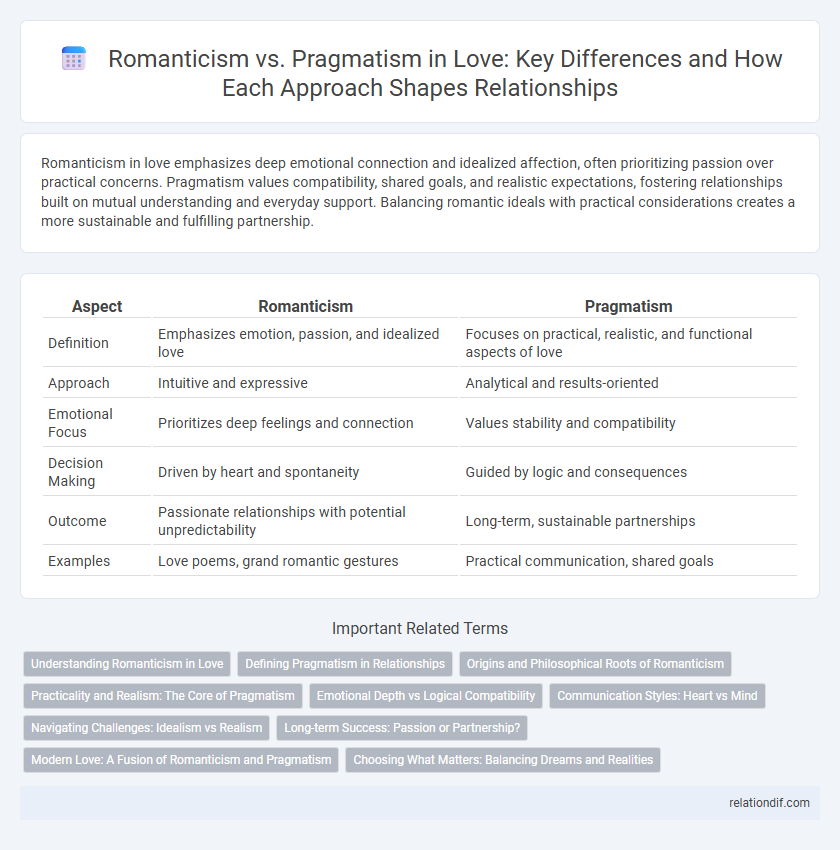Romanticism in love emphasizes deep emotional connection and idealized affection, often prioritizing passion over practical concerns. Pragmatism values compatibility, shared goals, and realistic expectations, fostering relationships built on mutual understanding and everyday support. Balancing romantic ideals with practical considerations creates a more sustainable and fulfilling partnership.
Table of Comparison
| Aspect | Romanticism | Pragmatism |
|---|---|---|
| Definition | Emphasizes emotion, passion, and idealized love | Focuses on practical, realistic, and functional aspects of love |
| Approach | Intuitive and expressive | Analytical and results-oriented |
| Emotional Focus | Prioritizes deep feelings and connection | Values stability and compatibility |
| Decision Making | Driven by heart and spontaneity | Guided by logic and consequences |
| Outcome | Passionate relationships with potential unpredictability | Long-term, sustainable partnerships |
| Examples | Love poems, grand romantic gestures | Practical communication, shared goals |
Understanding Romanticism in Love
Romanticism in love emphasizes deep emotional connection, idealization of partners, and passionate expressions that transcend logical reasoning. This approach values spontaneity, imagination, and the belief in soulmates, fostering a profound sense of intimacy and devotion. Understanding Romanticism in love involves appreciating emotional intensity and the pursuit of an idealized, often poetic, bond that contrasts with pragmatic considerations.
Defining Pragmatism in Relationships
Pragmatism in relationships centers on realistic expectations, valuing compatibility, communication, and conflict resolution over idealized notions of love. It emphasizes practical decision-making, focusing on shared goals and mutual respect to build a sustainable partnership. This approach contrasts with Romanticism by prioritizing stability and tangible efforts rather than purely emotional or passionate experiences.
Origins and Philosophical Roots of Romanticism
Romanticism in love originates from the late 18th-century European cultural movement emphasizing emotion, individualism, and idealized beauty, deeply rooted in the philosophical ideas of Jean-Jacques Rousseau and Immanuel Kant. Rousseau's focus on natural human emotions and Kant's notions of moral autonomy shaped romantic love as a spontaneous, transcendent experience beyond rational calculation. This contrasts with pragmatism, which views love through a practical, utilitarian lens often grounded in social contract theory and empirical outcomes.
Practicality and Realism: The Core of Pragmatism
Pragmatism in love emphasizes practicality and realistic expectations, focusing on mutual compatibility, effective communication, and problem-solving over idealized emotions. It prioritizes long-term stability and shared goals, ensuring relationships are grounded in everyday realities rather than fleeting passion. Romanticism often celebrates emotional intensity and idealism, but pragmatism sustains love through honest assessment and practical commitment.
Emotional Depth vs Logical Compatibility
Romanticism emphasizes emotional depth, valuing passionate connections and the intensity of feelings in love relationships. Pragmatism prioritizes logical compatibility, focusing on shared values, practical goals, and mutual understanding as foundations for lasting partnerships. Balancing emotional intensity with rational compatibility can create a more sustainable and fulfilling romantic bond.
Communication Styles: Heart vs Mind
Romanticism in love emphasizes expressive, emotional communication, valuing heartfelt words and spontaneous gestures that deepen intimacy. Pragmatism favors clear, rational dialogue focused on problem-solving and realistic expectations to sustain relationship stability. Balancing emotional openness with logical clarity enhances mutual understanding and strengthens connections.
Navigating Challenges: Idealism vs Realism
Romanticism embraces idealism, emphasizing passion and emotional connection as the foundation for love, often overlooking practical challenges. Pragmatism prioritizes realism, focusing on communication, compromise, and mutual support to navigate relationship obstacles effectively. Balancing these perspectives helps couples address conflicts with both heartfelt understanding and practical solutions, fostering resilience in love.
Long-term Success: Passion or Partnership?
Romanticism emphasizes passionate, often idealized love as the foundation for long-term success, highlighting emotional intensity and deep connection. Pragmatism prioritizes compatibility, shared values, and practical cooperation to ensure sustainable partnership and mutual growth. Research suggests that balanced relationships combining both passion and partnership traits tend to experience higher satisfaction and longevity.
Modern Love: A Fusion of Romanticism and Pragmatism
Modern love blends the passionate ideals of Romanticism with the practical considerations of Pragmatism, creating relationships grounded in both emotional depth and realistic expectations. Emotional connection and spontaneous affection coexist with clear communication and mutual goals, enhancing relationship stability. This fusion addresses evolving social dynamics, allowing partners to navigate love with both heart and reason.
Choosing What Matters: Balancing Dreams and Realities
Romanticism in love emphasizes idealized passion and emotional intensity, often prioritizing dreams and deep connections over practical concerns. Pragmatism values realistic expectations, stability, and mutual support, focusing on long-term compatibility and shared goals. Balancing these perspectives means choosing a partner who inspires both heartfelt passion and reliable partnership, integrating emotional fulfillment with practical life considerations.
Romanticism vs Pragmatism Infographic

 relationdif.com
relationdif.com